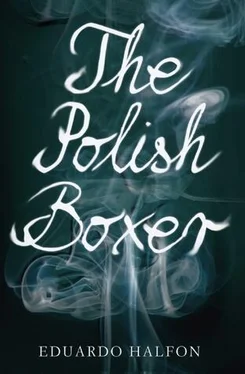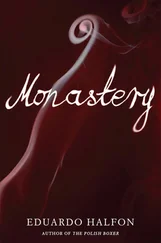Eduardo Halfon - The Polish Boxer
Здесь есть возможность читать онлайн «Eduardo Halfon - The Polish Boxer» весь текст электронной книги совершенно бесплатно (целиком полную версию без сокращений). В некоторых случаях можно слушать аудио, скачать через торрент в формате fb2 и присутствует краткое содержание. Год выпуска: 2012, Издательство: Bellevue Literary Press, Жанр: Современная проза, на английском языке. Описание произведения, (предисловие) а так же отзывы посетителей доступны на портале библиотеки ЛибКат.
- Название:The Polish Boxer
- Автор:
- Издательство:Bellevue Literary Press
- Жанр:
- Год:2012
- ISBN:нет данных
- Рейтинг книги:4 / 5. Голосов: 1
-
Избранное:Добавить в избранное
- Отзывы:
-
Ваша оценка:
- 80
- 1
- 2
- 3
- 4
- 5
The Polish Boxer: краткое содержание, описание и аннотация
Предлагаем к чтению аннотацию, описание, краткое содержание или предисловие (зависит от того, что написал сам автор книги «The Polish Boxer»). Если вы не нашли необходимую информацию о книге — напишите в комментариях, мы постараемся отыскать её.
marks the debut of a major new Latin American voice in English.
The Polish Boxer — читать онлайн бесплатно полную книгу (весь текст) целиком
Ниже представлен текст книги, разбитый по страницам. Система сохранения места последней прочитанной страницы, позволяет с удобством читать онлайн бесплатно книгу «The Polish Boxer», без необходимости каждый раз заново искать на чём Вы остановились. Поставьте закладку, и сможете в любой момент перейти на страницу, на которой закончили чтение.
Интервал:
Закладка:
It was snowing. From a distance, the houses of Sremčica looked like they were built of cardboard, and some of them probably were. Structures made of sackcloth, scraps of wood, bricks, rusted sheet metal, and anything else that might be on hand and might work: a Latin American village through and through. Pick up some stones, said Slobodan, crouching down. I asked him what for, but he didn’t hear me or didn’t want to answer me or didn’t have time, because a few seconds later we already had a pack of wild and rabid dogs running after us and barking and baring their teeth. Just pretend you’re going to throw stones at them, he said calmly, cigarette between his lips. And at the first imaginary throw, the dogs stopped barking and left us in peace. How did you know? I asked him when I got my breath back, but he didn’t answer. A few Gypsy women were already sweeping up and washing clothes on a patio as some children chased a couple of hens. When they saw us, everyone stopped. It looked as though they were barefoot, even though they weren’t. Wait for me here, said Slobodan, and he went to talk to the women. The children couldn’t stop touching his black suit. A row of dead animals hung from a clothesline. Rabbits and chickens, I thought. More women started to come out, just women, and I noticed that each time one walked up to the patio, the other women would grab one of her breasts, just like that, casually, as if it was some sort of greeting. I wanted to smile but I was too embarrassed. Slobodan came back. They say we should wait awhile, that he’ll be up soon. Who? I asked him. Petar, he said, lighting a cigarette. Do you know him? I asked. A bit, he said, but I doubt he’ll remember me. Somewhere in the distance, I heard a groaning sound, like a truck that wouldn’t start. I was anxious. I lit a cigarette. At that moment, the first man came out of one of the shacks and headed straight for the trough without saying a word. The second and third men did the same. What’s going on? I asked Slobodan. Among the Gypsies, he said, you can’t talk to a man in the morning until he’s washed his face. I realized that he knew a lot, maybe even too much, for someone who hated Gypsies. Then I realized that, for someone who hated Gypsies, he was also helping me too much. Why are you helping me? I asked him. He didn’t say anything for a few minutes, and I’d even forgotten I’d asked the question as I watched one man after another wash his face at the trough and then sit down around the table to drink Turkish coffee, when suddenly Slobodan whispered: I like to know the end of a story. He smiled. And also, he said, you’re going to help me with something later. I said I’d be glad to, and guessed that it wouldn’t come cheap. Watching the men enjoy their coffee, I wanted one too. That’s him, said Slobodan, that one there, the one in the brown coat. He was a short and dark-haired man and, like almost all of them, he had a big mustache. He was wearing a worn-out, wrinkled old suit, and I had the impression he’d even slept in it. I guessed that he was between thirty and forty. One of the women shouted something to him while she pointed at us. The man, his face still wet, walked over slowly. Petar held his hand out to Slobodan, who opened the cigarette pack for him straightaway, and the Gypsy took one. He ignored me until we were introduced. They started talking in Serbian and I heard the truck groaning again, only now it sounded more human, like someone in pain, like someone being tortured. We’re going to have breakfast, said Slobodan. And the three of us went out to the street to look for a taxi.
Splavoni. That’s what they called the floating houses I’d seen from the park the day before. The area was called Zemun. They were little cafés or restaurants shaped like ferries, and as I looked at them, I started thinking about some Mark Twain novel, or some film by Kim Ki-duk. All very theme park. All very kitsch. With names like Bangkok and Bombardier and Mississippi. Favorite haunts of the Serbian Mafia, Slobodan explained to me as we got out of the taxi in front of one named Savanna, which boasted, and why wouldn’t it, a rope bridge and drawings of lions and elephants on the walls and waiters in stupid safari costumes.
Slobodan and I had rolls with cheese and strawberry jam for breakfast and Petar wolfed down a huge slab of grilled meat. No one spoke until the coffees arrived in their little bamboo cups. Then Petar lit a cigarette and asked something in Serbian and Slobodan said go on, show him the photo, and the Gypsy took it and looked at it for a while, shaking his head. He says he’s never seen him. He says he doesn’t look like a Gypsy musician. He says it’s easier to milk a cow when it’s standing still. No idea. Without asking me, Petar slipped the photo into the inside pocket of his jacket, and I felt I’d lost it forever. They talked a bit in Serbian. Two thousand dinars, Slobodan said to me, which was about ten dollars. They argued about something for a moment. Another thousand, he added, and I gave him that too. Petar clapped a few times and shouted good, good, and put the cigarettes away in the inside pocket of his jacket. Ridiculous, really, but I suppose the cigarettes and the breakfast were part of the deal. Ask him what it means when a Gypsy does a pirouette, I said to Slobodan. Not now, he said, getting to his feet. I paid for everything and we left.
When we got back to Sremčica, Petar invited us in for a Turkish coffee with his family. Slobodan accepted immediately. If a Gypsy invites you into his house, he said, it’s rude to say no. I picked up a stone, but the rabid dogs had disappeared.
Petar’s wife was named Casandra. As soon as she saw us, she started cleaning the table and chairs with a damp cloth, somehow scandalized, incessantly complaining or arguing or at least that’s what it seemed like. Not once did she look at us. Besh, besh, shouted Petar. Sit down, in Romany, said Slobodan, and we all sat down. There were little flowers painted on the walls. It smelled of nutmeg, laundry, and rubbing alcohol. Sons and daughters-in-law came and went and children ran past and somewhere a baby was crying. All the men were smoking, the boys included. But not the women. The women, with flowery handkerchiefs covering their hair, tended to the men. Dragan, the eldest son, sat down with us. He looked just like his father and was decked out in a huge quantity of gold chains and bracelets. The three of them talked in Serbian and then father and son started to laugh. Petar asked where you’re from, explained Slobodan, and I told him Guatemala. I smiled. I helped them to pronounce Guatemala. Casandra brought in some rolls called bogacha and a pot of Turkish coffee and, still grumbling, poured out four little cups. It was strong and sweet and I had another one right away. An old man arrived. He poured himself a cup of Turkish coffee and asked me for a cigarette with his fingers and sat down with us. Sometimes they called him Ursari, sometimes Vodja, sometimes Vashengo, sometimes Bengalo. He didn’t talk much and reminded me immediately of Mr. Bojangles, but the tender and tragic Mr. Bojangles of Nina Simone’s version. I accepted a black tobacco cigarette from Dragan, which he’d rolled himself. Smoking and listening to them chat in Serbian, I started to think about how this homely and supposedly settled atmosphere also retained an odd sense of the provisional, of the ephemeral, of the transient, and I remembered the Jean Cocteau quote. Suddenly, everyone applauded. I’ve just asked them what a Gypsy’s pirouette means, said Slobodan, and it seems they liked the question. All right, so translate, I said excitedly. Dragan says it’s like the Gypsy boy who, one night, could hear his pig squealing and squealing and went out to see what was wrong and grabbed the pig’s snout and he found loads of gold coins inside, thousands of gold coins, and then he did a pirouette. Galbi, said Dragan rather proudly as he mimed rubbing coins together with his fingers. Petar shouted something. Petar says Gypsies sometimes do a pirouette before they die. How come? I asked Slobodan. Petar says he saw it once. A long time ago. In the forest. When he still lived in a caravan. He says that all the adults were sitting around a fire telling stories, and he’d lain down and was about to doze off, when he saw a man get up without a word, do a pirouette, and fall down dead next to some trees. Petar says he remembers it as though it had been a dream. We were all quiet, picturing the scene, I suppose. The old man asked something in Romany and then started to tell a story, also in Romany (he didn’t speak Serbian or maybe didn’t want to speak Serbian), which Petar followed and translated into Serbian and Slobodan translated into English and finally, like the last little deformed doll of a matryoshka, I translated for myself into Spanish. There once was a Gypsy king, he said, whose food was being stolen at night and so, getting worried, he declared that he’d give half his kingdom to whoever managed to watch over and protect his huge store of provisions and delicacies. Is that how you say it, delicacies? Delicacies. The oldest of his three sons told the king not to worry, that he’d do it. And that night, the eldest son lay down in front of the food store, vigilant and holding a dagger or a knife or something like that, I’m not sure how to translate it, but just before dawn, a cool breeze blew in and he fell into a deep sleep, and when he woke up, all the food was gone from the store. The next night, the king’s second son sat proudly in front of the doors of the food store, holding an enormous sword, yeah, a sword, but just before dawn a cool breeze blew again and he fell asleep, too, and when he woke up, all the food was gone from the store. The old man stopped and Petar drank his coffee down in one gulp and started shouting at some children who ran past, kicking a ball through the room. The third night, said Slobodan, the king’s youngest son promised his father that he’d guard the food, and he sat down in front of the store, but not before he’d lain some tacks or nails on the ground, something like that, something sharp. And just before dawn, when the cool breeze came again and he felt sleepy and laid his head on the tacks or nails or whatever they were, the pain woke him up immediately, and the youngest son saw his gentle little sister, an adolescent girl, come in barefoot and in her nightshirt, then he saw his sister do a single pirouette and, horrified (the old man made a frightened face), he saw his sister’s hands turning into axes (the old man raised his hands), and he saw his sister’s teeth turning into pointed daggers or knives (the old man showed me what were left of his teeth), and he saw his sister’s hair turning into cobras (the old man pulled on his hair), and now fully transformed into a witch, Slobodan translated as the old man and Petar and Dragan laughed, he watched his sister eat up all the food in the store. Silence. Typical, I thought, confusedly shuffling the three stories around in my head, and I asked if that was the end of the story, but everyone’s attention had already turned to something else. A girl had appeared with a tray in her hands. She was blond and slim, with a white complexion and green eyes, but a deep green, a Mediterranean green. She looked at us, blushing, put the tray on the table, and walked out. It’s hedgehog, said Slobodan, watching her go. It’s what? Hedgehog, he repeated while the two Gypsies dug in, using their fingers. They love hedgehog. The last time I came, he said, Petar explained to me that hedgehogs are always tastier in autumn, when they’re all chubby and full of fat to get through the winter. He also told me that once they’ve killed them, the Gypsies hang them up outside overnight, on a clothesline, because they believe that the glow of the moon improves the taste, and then the next day, to get all the spines off, they stick a tube into the dead animal’s side and start blowing until they’ve inflated it completely and they can separate the skin from the bones and pull out all the spines. Try it, he said. It tasted like fish.
Читать дальшеИнтервал:
Закладка:
Похожие книги на «The Polish Boxer»
Представляем Вашему вниманию похожие книги на «The Polish Boxer» списком для выбора. Мы отобрали схожую по названию и смыслу литературу в надежде предоставить читателям больше вариантов отыскать новые, интересные, ещё непрочитанные произведения.
Обсуждение, отзывы о книге «The Polish Boxer» и просто собственные мнения читателей. Оставьте ваши комментарии, напишите, что Вы думаете о произведении, его смысле или главных героях. Укажите что конкретно понравилось, а что нет, и почему Вы так считаете.












